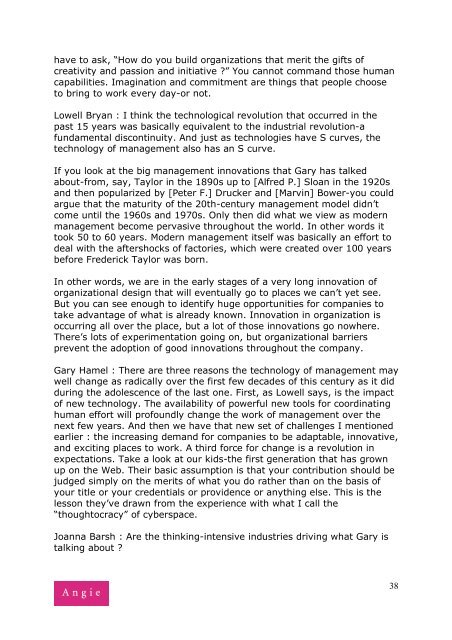nonfiction.fr, 17 décembre 2007 - Le blog de l'agence Angie
nonfiction.fr, 17 décembre 2007 - Le blog de l'agence Angie
nonfiction.fr, 17 décembre 2007 - Le blog de l'agence Angie
- No tags were found...
Create successful ePaper yourself
Turn your PDF publications into a flip-book with our unique Google optimized e-Paper software.
have to ask, “How do you build organizations that merit the gifts ofcreativity and passion and initiative ?” You cannot command those humancapabilities. Imagination and commitment are things that people chooseto bring to work every day-or not.Lowell Bryan : I think the technological revolution that occurred in thepast 15 years was basically equivalent to the industrial revolution-afundamental discontinuity. And just as technologies have S curves, thetechnology of management also has an S curve.If you look at the big management innovations that Gary has talkedabout-<strong>fr</strong>om, say, Taylor in the 1890s up to [Al<strong>fr</strong>ed P.] Sloan in the 1920sand then popularized by [Peter F.] Drucker and [Marvin] Bower-you couldargue that the maturity of the 20th-century management mo<strong>de</strong>l didn’tcome until the 1960s and 1970s. Only then did what we view as mo<strong>de</strong>rnmanagement become pervasive throughout the world. In other words ittook 50 to 60 years. Mo<strong>de</strong>rn management itself was basically an effort to<strong>de</strong>al with the aftershocks of factories, which were created over 100 yearsbefore Fre<strong>de</strong>rick Taylor was born.In other words, we are in the early stages of a very long innovation oforganizational <strong>de</strong>sign that will eventually go to places we can’t yet see.But you can see enough to i<strong>de</strong>ntify huge opportunities for companies totake advantage of what is already known. Innovation in organization isoccurring all over the place, but a lot of those innovations go nowhere.There’s lots of experimentation going on, but organizational barriersprevent the adoption of good innovations throughout the company.Gary Hamel : There are three reasons the technology of management maywell change as radically over the first few <strong>de</strong>ca<strong>de</strong>s of this century as it didduring the adolescence of the last one. First, as Lowell says, is the impactof new technology. The availability of powerful new tools for coordinatinghuman effort will profoundly change the work of management over thenext few years. And then we have that new set of challenges I mentione<strong>de</strong>arlier : the increasing <strong>de</strong>mand for companies to be adaptable, innovative,and exciting places to work. A third force for change is a revolution inexpectations. Take a look at our kids-the first generation that has grownup on the Web. Their basic assumption is that your contribution should bejudged simply on the merits of what you do rather than on the basis ofyour title or your cre<strong>de</strong>ntials or provi<strong>de</strong>nce or anything else. This is thelesson they’ve drawn <strong>fr</strong>om the experience with what I call the“thoughtocracy” of cyberspace.Joanna Barsh : Are the thinking-intensive industries driving what Gary istalking about ?38











